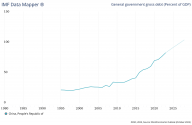Worth noting that measurements of Chinese consumption are undercounting actual consumption because a lot of it is "in-kind" (e.g. subsidised by the state) and thus doesn't show up in GDP accounting as it isn't private consumption per se. A good example are subsidised lunches but there are many others.
China's problem is very rapid debt accumulation. Right now it isn't a major problem but it will be 10-15 years from now unless there is a radical re-orientation. Note that when Xi took power it was only 34% of GDP. Now it will hit 100% of GDP within a few years. This is on him. It was also pretty stable, even after the GFC. So this is clearly his policies.

Given how poor China still is (per capita GDP lower than Mexico and Bulgaria) there is simply no justification for why the state should accumulate this much debt at a comparatively modest level of development.
China's problem is very rapid debt accumulation. Right now it isn't a major problem but it will be 10-15 years from now unless there is a radical re-orientation. Note that when Xi took power it was only 34% of GDP. Now it will hit 100% of GDP within a few years. This is on him. It was also pretty stable, even after the GFC. So this is clearly his policies.

Given how poor China still is (per capita GDP lower than Mexico and Bulgaria) there is simply no justification for why the state should accumulate this much debt at a comparatively modest level of development.
